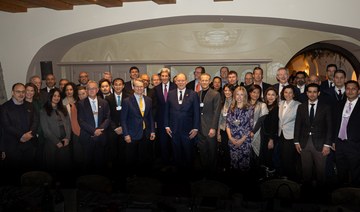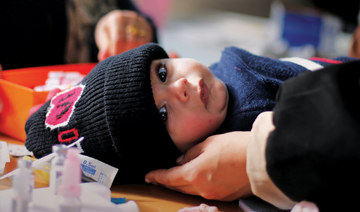LONDON: Strategic deals launched by powers including Saudi Arabia could reshape a region simmering with tensions, an Israeli journalist on a panel at the World Economic Forum said on Friday.
In the panel titled “Anticipating the Middle East in 2024,” experts and government officials discussed the turbulent regional situation, with the Gaza conflict, Iran, Hezbollah, the Houthis, and potential Saudi normalization with Israel high on the agenda.
“If the US wants to manage the (Gaza) conflict … it needs to embrace a pathway to two states,” said Jane Harman, chair of the US Commission on the National Defense Strategy.
“I think that without doing that, there will never be conflict management. And if that happens, the outlier is Iran.”
Mahmood Sariolghalam, professor of international relations at the National University of Iran and non-resident scholar at the Middle East Institute, said: “No Arab country will accept Iranian political or military dominance in the region. And I think that also includes Shiite Iraq.”
He added: “I think Iran is wasting its national resources in promoting this kind of foreign policy. And my estimate would be that it’s going to take at least 10 years, from my observations of the country, for Iran to realize that the real ingredient of power isn’t the military.
“Rather, it’s capital markets, platform companies and development of national infrastructure, and integrating with the rest of the region economically.”
Barak Ravid, an Israeli journalist with US news website Axios, said Saudi-Iranian convergence on regional matters could open a path to peace.
“Both Saudi Arabia and Iran have a lot of shared interests, especially, I think, Yemen,” he added. “Both countries wanted to sort of end it (bilateral tensions) or at least reach a long-term truce, as we’ve seen over the last year.
“And economically, both Iran and Saudi Arabia have a lot of interest to promote trade and things like that, and to try and at least cool down the tensions between the Saudi axis, if there is one, and what Iran calls the Axis of Resistance — and I think they managed to do it pretty well.
“I think the Saudis … don’t see the rapprochement with Iran as contradictory to their efforts to normalize relations with Israel. I think they both can live at the same time.”
Sariolghalam said Tehran is playing a balancing act through its network of militias — “sending messages” to its enemies but also preventing escalation in any of its strongholds.
“On Lebanon, I think it’s very clear that Iran isn’t interested in escalation, because this time around it isn’t going to be like 2006,” he added, referring to Israel’s last invasion of its northern neighbor.
“There’s a great chance that Hezbollah might be devastated through not only Israeli operations but also American involvement … And Lebanon is an extremely vulnerable country and society.”
Ravid agreed, saying Hezbollah, in its border operations in southern Lebanon that began in the wake of the Oct. 7 Hamas attack, “realized that they don’t need to go on an all-out escalation against Israel in order to have a lot of impact.”
However, Hezbollah’s unwillingness to escalate strikes against Israel could change, Harman warned, saying the Lebanese government’s coalition structure makes managing the country’s security “very difficult.”
Ravid also warned that “it’s totally possible that the worst is still to come,” describing a potential Hezbollah-Israel war as making the Gaza conflict “look like a walk in the park.”
He said the US should be making “much more robust” efforts to contain the situation between the two sides, “because if the border between Lebanon and Israel doesn’t (calm) down within weeks, it can really blow up.”
Despite the region’s conflicts, economic progress presents a major opportunity this year, Sariolghalam said, predicting that Gulf Cooperation Council countries “will continue to thrive” throughout 2024.
“The region is going to have, in parallel, continuing conflict, and at the same time staggering economic progress,” he added.
Ravid warned that despite prospects for Saudi normalization with Israel, momentum in Tel Aviv is moving toward a one-state “reality” that will fail to serve as a long-term solution for Palestinians.
“We see the one-state reality in the West Bank right now,” he said. “When you have settlers and Palestinians, settlers have rights and Palestinians don’t — and this is where this thing is going.”
Saudi diplomacy could reshape region, Israeli journalist tells WEF
https://arab.news/rvmhs
Saudi diplomacy could reshape region, Israeli journalist tells WEF

- Barak Ravid: Potential Hezbollah-Israel war would make Gaza ‘look like a walk in the park’
- Iranian scholar: ‘No Arab country will accept Iranian political or military dominance in the region’
Rafah incursion would put hundreds of thousands of lives at risk, UN aid agency says

- Leaders internationally have urged Israeli Prime Minister Benjamin Netanyahu to be cautious
- US Defense Secretary Lloyd Austin said any US response to incursion would be up to President Biden
GAZA: The United Nations humanitarian aid agency says hundreds of thousands of people would be “at imminent risk of death” if Israel carries out a military assault in the southern Gaza city of Rafah.
The city has become critical for humanitarian aid and is highly concentrated with displaced Palestinians.
Leaders internationally have urged Israeli Prime Minister Benjamin Netanyahu to be cautious about any incursion into Rafah, where seven people — mostly children — were killed overnight in an Israeli airstrike.
On Thursday, US Defense Secretary Lloyd Austin said any US response to such an incursion would be up to President Joe Biden, but that currently, “conditions are not favorable to any kind of operation.”
Turkiye’s trade minister said Friday that its new trade ban on Israel was in response to “the deterioration and aggravation of the situation in Rafah.”
The Israel-Hamas war has driven around 80 percent of Gaza’s population of 2.3 million from their homes, caused vast destruction in several towns and cities, and pushed northern Gaza to the brink of famine.
The death toll in Gaza has soared to more than 34,500 people, according to local health officials, and the territory’s entire population has been driven into a humanitarian catastrophe.
The war began Oct. 7 when Hamas attacked southern Israel, abducting about 250 people and killing around 1,200, mostly civilians. Israel says militants still hold around 100 hostages and the remains of more than 30 others.
Dozens of people demonstrated Thursday night outside Israel’s military headquarters in Tel Aviv, demanding a deal to release the hostages. Meanwhile, Hamas said it would send a delegation to Cairo as soon as possible to keep working on ceasefire talks. A leaked truce proposal hints at compromises by both sides after months of talks languishing in a stalemate.
Across the US, tent encampments and demonstrations against the Israel-Hamas war have spread across university campuses.
More than 2,000 protesters have been arrested over the past two weeks as students rally against the war’s death toll and call for universities to separate themselves from any companies that are advancing Israel’s military efforts in Gaza.
Iraqi militant group claims missile attack on Tel Aviv targets, source says

- The attack was carried out with multiple Arqub-type cruise missiles
BAGHDAD: The Islamic Resistance in Iraq, a group of Iran-backed armed groups, launched multiple attacks on Israel using cruise missiles on Thursday, a source in the group said.
The source told Reuters the attack was carried out with multiple Arqub-type cruise missiles and targeted the Israeli city of Tel Aviv for the first time.
The Islamic Resistance in Iraq has claimed dozens of rockets and drone attacks on US forces in Iraq and Syria and on targets in Israel in the more than six months since the Israel-Hamas war erupted on Oct. 7.
Israel has not publicly commented on the attacks claimed by Iraqi armed groups.
15 pro-government Syrian fighters killed in Daesh attacks: monitor

- It is the latest attack of its kind by remnants of the jihadists
BEIRUT: Daesh group militants killed at least 15 Syrian pro-government fighters on Friday after they attacked three military positions in the Syrian desert, a war monitor said.
It is the latest attack of its kind by remnants of the jihadists.
They “attacked three military sites belonging to regime forces and fighters loyal to them... in the eastern Homs countryside, triggering armed clashes... and killing 15” pro-government fighters, the British-based Syrian Observatory for Human Rights said.
Daesh overran large swathes of Syria and Iraq in 2014, proclaiming a so-called caliphate and launching a reign of terror.
It was defeated territorially in Syria in 2019, but its remnants continue to carry out deadly attacks, particularly against pro-government forces and Kurdish-led fighters in the vast desert.
Daesh remnants are also active in neighboring Iraq.
Last month, Daesh fighters killed 28 Syrian soldiers and affiliated pro-government forces in two attacks on government-held areas of Syria, the Observatory said.
Many were members of the Quds Brigade, a group comprising Palestinian fighters that has received support from Damascus ally Moscow in recent years, according to the Observatory, which has a network of sources inside Syria.
In one of those attacks, the jihadists fired on a military bus in eastern Homs province, the Observatory said at the time.
Separately, six Syrian soldiers died in an Daesh attack against a base in eastern Syria, it added.
Syria’s war has claimed the lives of more than half a million people and displaced millions more since it erupted in March 2011 with Damascus’s brutal repression of anti-government protests.
It then pulled in foreign powers, militias and jihadists.
In late March, Daesh militants “executed” eight Syrian soldiers after an ambush, the monitor said at that time.
The jihadists also target people hunting desert truffles, a delicacy which can fetch high prices in the war-battered economy.
The Observatory in March said Daesh had killed at least 11 truffle hunters by detonating a bomb as their car passed in the desert of Raqqa province in northern Syria.
In separate unrest in the country, Syria’s defense ministry earlier on Friday said eight soldiers had been injured in Israeli air strikes near Damascus.
The Observatory said Israel had struck a government building in the Damascus countryside that has been used by Lebanon’s Iran-backed Hezbollah group since 2014.
The Israeli military has carried out hundreds of strikes in Syria since the outbreak of Syria’s civil war, mainly targeting army positions and Iran-backed fighters.
Prominent Gaza doctor killed by torture in Israeli detention

- Al-Bursh died in Ofer Prison, an Israeli-run incarceration facility in the West Bank, says the Palestinian Prisoners Society
GAZA: Adnan Al-Bursh, a Palestinian surgeon and former head of orthopedics at Gaza’s Al-Shifa medical complex, was killed on April 19 under torture in Israeli detention.
According to a statement from the Palestinian Prisoners Society, Al-Bursh, 50, died in Ofer Prison, an Israeli-run incarceration facility in the West Bank.
His body remains held by the Israeli authorities, according to the Palestinian Civil Affairs Committee.
The Palestinian Prisoners Society described the doctor’s death in Israeli custody as “assassination.”
Al-Bursh, who was a prominent surgeon in Gaza’s largest hospital Al-Shifa, was reportedly working at Al-Awada Hospital in the northern Gaza Strip when he was arrested by Israeli forces.
The Israeli prison service declared Al-Bursh dead on April 19, claiming the doctor was detained for “national security reasons.”
However, the prison’s statement did not provide details on the cause of death. A prison service spokesperson said the incident was being investigated.
Francesca Albanese, the UN special rapporteur on the occupied Palestinian territories, said on Thursday she was “extremely alarmed” at the death of the Palestinian surgeon.
“I urge the diplomatic community to intervene with concrete measures to protect Palestinians. No Palestinian is safe under Israel’s occupation today,” she wrote on X.
I am extremely alarmed by information that Dr. Adnan Albursh, a well-known surgeon at #alshifa_hospital, has died while detained by Israeli forces in the Ofer military prison. While I acquire more information, I URGE the diplomatic community to intervene with CONCRETE MEASURES to…
— Francesca Albanese, UN Special Rapporteur oPt (@FranceskAlbs) May 2, 2024
Since Oct. 7, when Israel launched its retaliatory bombing campaign in the Gaza Strip, the Israeli military has carried out over 435 attacks on healthcare facilities in the besieged Palestinian enclave, killing at least 484 medical staff, according to UN figures.
However, the health authority in Gaza said in a statement that Al-Bursh’s death has raised the number of healthcare workers killed in the ongoing onslaught on the strip to 496.
Palestinian prisoner organizations report that the Israeli army has detained more than 8,000 Palestinians from the West Bank alone since Oct. 7. Of those, 280 are women and at least 540 are children.
ICC prosecutor calls for end to intimidation of staff, statement says

- The ICC prosecutor’s office said all attempts to impede, intimidate or improperly influence its officials must cease immediately
- The statement followed Israeli and American criticism of the ICC’s investigation into alleged war crimes committed during the Israel-Hamas conflict in Gaza
AMSTERDAM: The International Criminal Court’s prosecutor’s office called on Friday for an end to what it called intimidation of its staff, saying such threats could constitute an offense against the world’s permanent war crimes court.
In the statement posted on social media platform X, the ICC prosecutor’s office said all attempts to impede, intimidate or improperly influence its officials must cease immediately. It added that the Rome Statute, which outlines the ICC’s structure and areas of jurisdiction, prohibits these actions.
The statement, which named no specific cases, followed Israeli and American criticism of the ICC’s investigation into alleged war crimes committed during the Israel-Hamas conflict in the Gaza Strip, a Palestinian enclave.
Neither Israel nor its main ally the US are members of the court, and do not recognize its jurisdiction over the Palestinian territories. The court can prosecute individuals for alleged war crimes, crimes against humanity and genocide.
Last week Israel voiced concern that the ICC could be preparing to issue arrest warrants for government officials on charges related to the conduct of its war against Hamas in Gaza.
Foreign Minister Israel Katz said Israel expected the ICC to “refrain from issuing arrest warrants against senior Israeli political and security officials,” adding: “We will not bow our heads or be deterred and will continue to fight.”
On Friday, Israeli Prime Minister Benjamin Netanyahu said any ICC decisions would not affect Israel’s actions but would set a dangerous precedent.
In October, ICC Chief Prosecutor Karim Khan said it had jurisdiction over any potential war crimes committed by Hamas fighters in Israel and by Israeli forces in Gaza, which has been ruled by Hamas since 2007.
A White House spokesperson said on Monday the ICC had no jurisdiction “in this situation, and we do not support its investigation.”






















